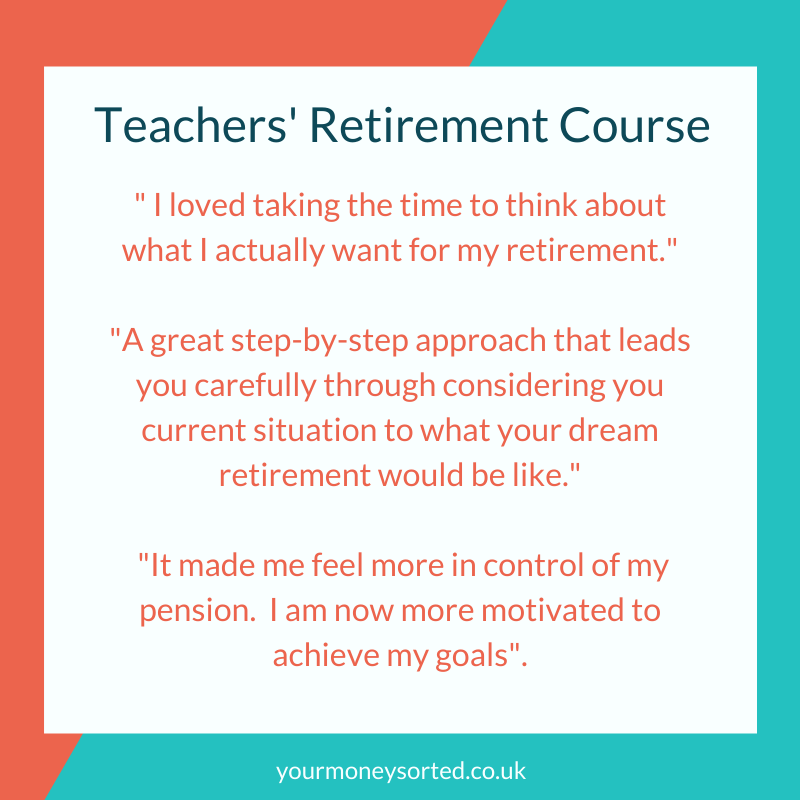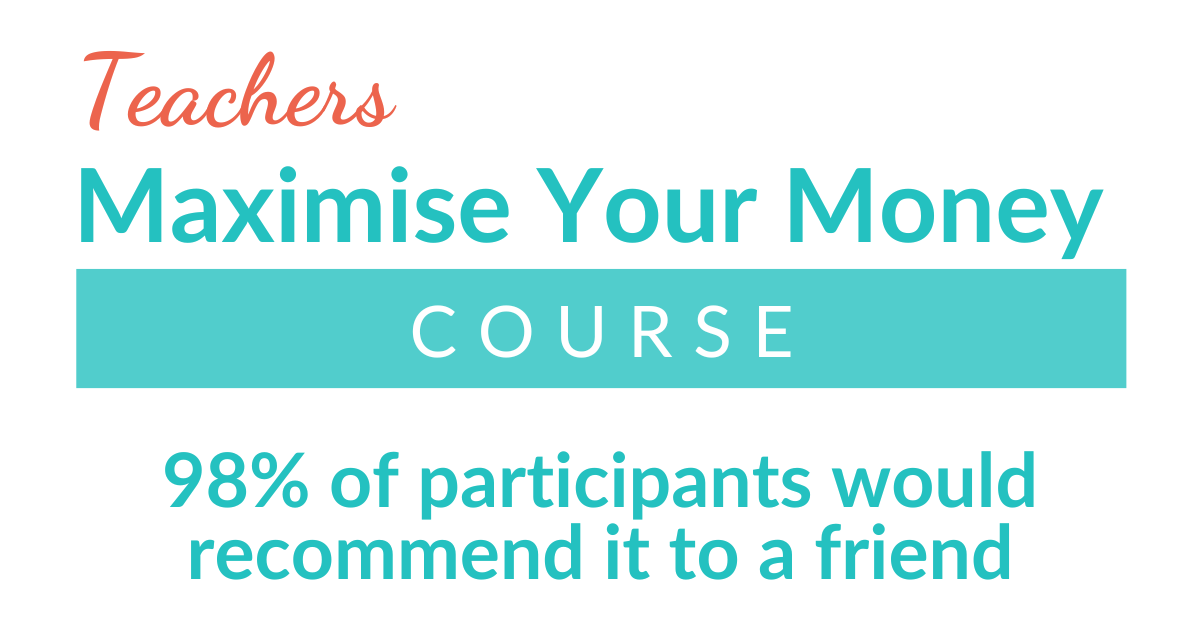Claim your freebie!
Teachers' Retirement Planning
- Find out your pension’s worth
- Get state pension statement
- Calculate ideal retirement income
- Estimate retirement income
Take a course!
- know your ideal and predicted income in retirement
- be empowered to take more control of your own retirement
- identify the steps needed for an exciting, well-deserved, early retirement
It's hard to find simple, straightforward answers to the most commonly asked teachers' pensions FAQ, so I have tried to demystify them in this post. Kevin Boyle, Area Manager for Wesleyan Assurance joined me to answer some of the common questions that teachers have about their pension.
From early in your career right up to when you are planning for retirement, taking the time to learn even the basic information about your pension is very important.
The sooner you start planning for retirement, the less it will cost you!
Is the teachers pension scheme still a good one?
According to Kevin, it is still a good scheme because it delivers a guaranteed sum. Based on the number of years you have been teaching and paying into the scheme, you can work out how much you’re going to receive when you retire. With many other pensions, the amount you get depends on the value of the pension pot, which can fluctuate with the stock market ups and downs.
What are the benefits of the teachers' pension scheme?
One of the main benefits of paying into a pension is tax relief. This is not just for Teachers' Pensions, but for all pensions. This is one way of encouraging people to opt-in to paying their pension scheme because they only pay for the net amount.
You get tax relief on your pension and some of the money that you would've paid in tax goes into your pension pot rather than to the government. Tax relief is paid on your pension contributions at the highest rate of income tax you pay.
Unpromoted teachers will be basic-rate taxpayers and get 20% pension tax relief, higher-rate taxpayers can claim 40% pension tax relief and additional-rate taxpayers can claim 45% tax relief. This is slightly different for Scotland because we have more tax brackets, but the principle is the same.
Aside from that, the scheme offers flexibility wherein it provides options for teachers who want to retire early or flexibly retire. There's also a quality sickness benefit with various options depending on whether you can return to teaching or whether you can even work at all.
In addition to that, there are death benefits. Typically it is three times your gross salary and a proportion of your pension will be given to those that you will leave behind. You are entitled to this benefit as long as you're teaching and still paying into the pension scheme. You don't actually have to drop dead in the classroom!

Do I have to pay into the Teachers' Pensions Scheme?
The Teachers' Pension is an opt-in scheme. It's not compulsory and Kevin pointed out that although "it's a substantial amount, once it's gone, it's gone". Over the years, Kevin has encountered teachers who are early on in their career thinking “I could do without paying this money.” But he also sees teachers who are near the end of their career commenting “I wish I had started sooner or paid in a bit more.”
How much do I pay into my Teachers' Pension?
You pay in a percentage of your gross salary, with the percentages ranging from 7.2% to 11.9%, depending on your salary. Your employer will also pay around 23%, which is a significant contribution, considering that employers only have to pay 5% to the automatic enrolment workplace pension scheme that was rolled out in 2012. The amounts vary between all countries in the UK and a quick google will help you to establish exactly what percentage you pay in.
Final Salary Scheme and the Care Scheme: What’s the Difference?
Kevin said that the Final Salary Scheme was costly, people were living longer and they predicted it was going to be difficult to fund it, so changes were made in the review of Teachers' Pensions in 2015.
If you started teaching before 2015, you will have paid into both schemes and any benefits you had in the Final Salary scheme are protected and you start building up a second pension under the Care Scheme. Your pension statement will show you the predicted amounts for each scheme, but you will get a single pension payment when you take your pension.
Final Salary Scheme
- NPA (Normal pension age) 60 or 65 (if you joined on or after 1 Jan 2007)
- Guaranteed benefits, based on the number of years worked and your final salary
- Any money paid into this scheme is protected - you will receive this and any benefits built up in the CARE scheme
- Can purchase Additional Pension
Care Scheme
- NPA 65 or State Pension Age (SPA), whichever is later. SPA is currently 68 for anyone born after 6th April 1978 and is proposed to be raised to 68 for anyone born on or after 6th April 1970
- Earn a "slice" of pension for every year that you work (1/57th of your salary is the yearly amount)
- Guaranteed benefits, based on your career average salary
- Can purchase Additional Pension
- Can elect to purchase Faster Accrual, meaning you will pay more in and build up benefits more quickly
What about early retirement?
You can take early retirement in both schemes. This will be with a reduced pension and currently can be taken from 55, though there are plans to increase this to 57 from 2028. The government is also proposing to keep the age at which you can access your pension early, to 10 years below SPA, so there is a chance that this could rise to 58 and even 59. That wouldn't feel much like early retirement to me!
According to Kevin, there is a penalty when you take your pension out early. In the old scheme, your NPA was 60, so retiring at 55, was 5 years early. This would reduce your pension by around 4% per year; a 20% reduction overall. On the new scheme, with an NPA of 65 and a retirement age of 55, 10 years early would cause a substantial reduction in your pension and may make early retirement impossible.
This is why it is important that teachers should consider their retirement options as early on in life as possible. The sooner you start thinking about it and preparing for it, the sooner you can relax in the knowledge that you can retire from teaching whenever you want.

What will I get on retirement?
This again varies between the different schemes and depends on when you joined the pension scheme. Members who joined before 1 January 2007 will receive an automatic lump sum which is 3 x their pension. If you have service after 1 January 2007, then you can choose to convert some of your pension into a lump sum. If you choose to convert some of your pension to a lump sum, your yearly pension will be permanently reduced.
You will also get a yearly pension, which will increase each year in line with the Pensions Increase (PI), applied to public sector pensions in April each year. The amount of PI varies from year to year and is based on the Consumer Price Index from the previous year.
"The less you need to live in retirement, the sooner you can retire. But until you work out what your outgoings are, and what your outgoings might be in 20 years' time, you don't really know how much you need."
Eileen Adamson
What about part-time teachers?
Part-time teachers still contribute to the pension scheme, but their pension will obviously be less than that of a full-time teacher.
I had been teaching full-time for 10 years, then part-time for 10, when I discovered that my pension was only going to be £6,000! This was because my 10 years of teaching 0.4 only counted for 4 years of service.
This was a huge concern for me and made me miserable for a few years, because I thought that I would have to teach until 67 before I could afford to retire! However, after a couple of years of feeling sorry for myself, I realised that there were lots of options available to me and I started to take action and now know that I can leave teaching at 55!
That's why I now help other teachers to create financial security and prepare more effectively for retirement.
"It's about arming yourself with information and then making decisions. The earlier you do this, the better."
Eileen Adamson

Can I just stop my pension for a few years?
It can be tempting to consider pausing your pension contributions if money is tight, but you should think very carefully before doing so. It is likely to cost you more, in the long run, to make up for the time that you stopped paying. Instead, try to find other ways of cutting back or other ways of earning more money.
I have years missing, what should I do?
If you have never checked your pension provider’s website, then it's important that you do so. If you look at your statement and think that there are any years missing, then you should investigate this.
Kevin mentioned that this doesn't happen that often, but it does happen particularly when you've moved about a lot. For example, you've moved up from England, came up to Scotland or you've moved local authorities.
If you have years missing, you’d have to go back and trace your national insurance contributions. You'd have to go back and provide proof that you were working and making payments in the teacher's pension scheme during those years in question.
Kevin advises to not leave this to the last minute, because they have had teachers who have contacted them three months before their retirement going, “Look, I think I've got 10 years missing here.” He said "You're not going to fix that in a month or two so start looking early. Once you've got it on track, you don't have to worry about that. If you think there's an obvious problem there, you've got to go back and fix it."
Teachers' Pensions FAQ - What should I do now?
It's all about gaining knowledge and having the confidence to ask questions to demystify some of the pension information that you find confusing. The big difference is taking the first step of educating yourself with pension information early on to keep you on track and start thinking about your retirement plan. You should:
- Decide when you would like to retire.
- Work out how much you will need in retirement.
- Find out how much your pension is predicted to be.
- Take action, if your pension is not going to be enough to allow you to retire when you want to.

I hope that you have found this Teachers' Pension FAQ post useful. If you have more questions about Teachers' Pensions and about living a happier, healthier and wealthier life as a teacher, then head over to my Your Money Sorted Facebook group, where you will be made most welcome.

Hi, I’m Eileen Adamson, teacher, money coach, host of Your Money Sorted Teachers' Podcast and ex co-host of BBC podcast Clever About Cash. I help female teachers to become happier, healthier and wealthier.
For more information on how I can help you, please see my coaching courses, my favourite products and services, my Etsy shop or my Amazon shop.










